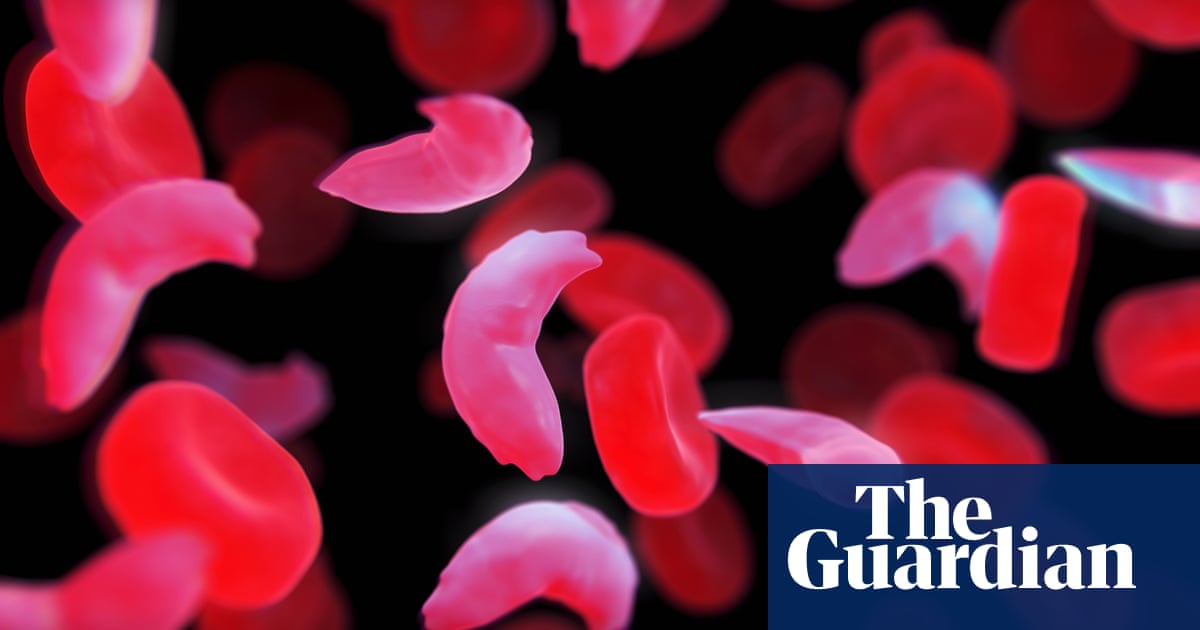The UK’s regulatory body for medicines has given approval for a gene therapy to treat two blood disorders.

The UK’s drug regulatory agency has authorized a revolutionary therapy for two chronic and incapacitating blood conditions, which involves modifying the gene responsible for their development.
The MHRA has approved the use of Casgevy for treating patients with sickle cell disease and beta thalassemia.
This is the first authorized medication that utilizes genetic editing with CRISPR, also known as the “genetic scissors”. Its creators were awarded the Nobel Prize in Chemistry for this innovation.
The developers at Casgevy are optimistic that their innovative treatment could eliminate the suffering caused by sickle cell disease, including pain, infections, and anemia, as well as the severe anemia commonly experienced by individuals with beta thalassemia.
Around 15,000 individuals in the United Kingdom, the majority of whom are of African or Caribbean descent, suffer from sickle cell disease. An additional 1,000 people, primarily of Mediterranean, south Asian, south-east Asian, and Middle Eastern ancestry, have beta thalassemia and require frequent blood transfusions for the treatment of their anemia.
Professionals specializing in diseases are optimistic that Casgevy could potentially serve as a remedy, eliminating the need for individuals with these conditions to undergo a procedure involving the transplantation of bone marrow. Up until now, this has been the sole option for treatment, despite the possibility of the recipient’s body rejecting the donated marrow.
The Sickle Cell Society expressed their enthusiasm for the MHRA’s recent decision, calling it a “landmark moment” for the sickle cell community that brings a sense of renewed hope and positivity.
The organization stated that the endorsement of Casgevy, created by Vertex Pharmaceuticals, is allowing the NHS to utilize it as a revolutionary treatment for individuals struggling with this illness. This condition is characterized by ongoing anemia, frequent episodes of severe pain necessitating hospitalization, organ impairment, a heightened risk of stroke, and early death.
Sickle cell disease and beta thalassemia are hereditary conditions that result from mistakes in the genes responsible for producing haemoglobin, a protein that aids in the transportation of oxygen by red blood cells throughout the body. These conditions can potentially lead to death.
The MHRA announced that Casgevy’s purpose is to correct a defective gene in a person’s bone marrow stem cells, allowing for the production of functional haemoglobin in the body. This process involves extracting stem cells from the bone marrow, making edits to them in a lab, and then reintroducing them into the patient. This treatment has the potential to provide long-lasting results.
In this procedure, lab workers utilize the “genetic scissors” to modify or slice the DNA of the cells from the patient’s bone marrow. Afterwards, the treated cells are infused back into the patient.
According to the MHRA, patients may have to stay in the hospital for around a month as the treated cells establish themselves in the bone marrow and begin producing red blood cells with stable haemoglobin.
During a study of Casgevy’s effectiveness in treating sickle cell disease, 28 out of 29 patients did not have any major pain episodes that would require hospitalization for at least one year.
39 out of 42 participants in the trial who had beta thalassemia did not require a blood transfusion for at least 12 months after being treated with Casgevy.
Dr. Sara Trompeter, a haematology consultant at University College Hospital London and an expert in sickle cell disease, stated that while not all patients are suitable for curative treatments, gene therapy presents a genuine opportunity for a cure for those who cannot receive bone marrow transplants. She expressed her delight in the approval of this therapy by the MHRA.
Source: theguardian.com


